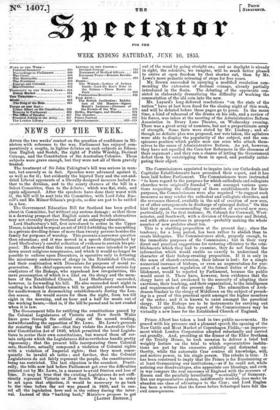NEWS OF THE WEEK.
AFTER the two weeks' contest on the question of confidence in Mi- nisters with reference to the war, Parliament has enjoyed com- paratively a respite, in lighter debates on such subjects as Educa- tion English and Scotch, the right of Public Worship, Decimal Coinage, and the Constitution of the Australian Colonies. These subjects were grave enough, but they were not all of them gravely treated.
The treatment of Sir John Pakington's bill was serious in man- leer, but scarcely so in fact. Speeches were advanced against it, as well as for it; but evidently the bigoted Tory and the cut-and- dried Liberal opponents of a liberally-designed measure looked ra- ther to the division, and to the scanty chances of the bill in a Select Committee, than to the debate; which was flat, stale, and again adjourned. After the speakers have done their worst with it, the bill will be sent into the Committee, with Lord John Rus- sell's and Mr. Milner Gibson's projects, as dice are put to be rattled in .a box.
Tha Government Education Bill_for Scotland has been pulled about in CoMmittee, but without any serious damage; so that there is a dawning prospect that English saints and Scotch obstruetives may not eternally deprive Scotland of an enlarged education.
Lord Shafteshury's bill, first introduced to notice in the Upper House, is intended to repeal an act of 1812 forbidding the assembling in a private dwelling-house of more than twenty persons besides the family for purposes of worship. This presents a narrower question than education; and it was moved in a speech distinguished by Lord Shaftesbury's careful collection of evidence to sustain his pro- posal. He showed that this remnant of laws once intended to put down secret religious conspiracies, and which it would no longer be possible to enforce upon Dissenters, is operative only in fettering the missionary endeavours of clergy in the Established Church, and _their combination with Dissenters for purposes of moral re- generation. His chief opponents were the Bishops and certain lay coadjutors of the Bishops, who apprehend low irregularities, the mere presumption of which is a libel on the clergy and the mem- bers of the Established Church. Lord Shaftesbury succeeded, however, in forwarding his bill. He also succeeded next night in sending to a Select Committee a bill to prohibit protracted hours for needlevromen in dressmaking establishments during the Lon- don season. He would secure for them the night, from ten till eight in the morning, and an hour and 'a half for meals out of the working bours,—that is, if the bill be passed and be not evaded when it is law.
The Government bills for ratifying the constitutions passed by the Colonial Legislatures of Victoria and New South Wales have gone through the critical stage of the second reading, notwithstanding the opposition of Mr. Lowe. Mr. Lowe's grounds for resisting the bill are—that they violate the Australian Colo- nies' Constitution Act of 1850, Which permitted the local Legisla- tures to revise their own constitutions, but warned them off cer- tain subjects which the Legislatures did nevertheless handle pretty vigorously ; that the present bills incorporating these Colonial acts, therefore, actually compound a violation of Colonial rights with a violation of Imperial rights; that they must conse- quently be invalid ab initio ; and further, that the Colonial Legislatures do not fairly represent the people, the constituencies being too restricted. The last objection is the soundest. Practi- cally, the bills now laid before Parliament get over the difficulties pointed out by Mr. Lowe, in a manner to avoid friction and loss of time. It may be true that the existing Legislatures do not suffi- ciently represent Victoria or New South Wales ; but in order to act upon that objection, it would be necessary to go back to the time before the act was passed in 1850, and to can- cel all the legislation here and in the colony during the inter- val. Instead of this "harking back," Ministers propose to get out of the wood by going straight on; and as daylight is already in sight, the colonists, we imagine, will be much better pleased to arrive at open freedom by that shorter out, than by Mr. Lowe's more pedantic retracing of steps for five years.
Mr. Brown succeeded in carrying a modified resolution com- mending the extension of decimal coinage, already partially introduced in the florin. The debating of the opponents con- sisted in elaborately dramatizing the difficulty of working the commutation of the old coin into the new.
Mr. Layard's long-deferred resolutions "on the state of the nation" have at last been fixed for the closing night of this week, and will be debated before these pages go to press. In the mean time, a kind of rehearsal of the drama on his side, and a review of his forces, was taken at the meeting of the Administrative Reform Association in Drury Lane Theatre, on Wednesday evening. There was a great array of numbers, but not a proportionate array of strength. Some facts were stated by Mr. Lindsay ; and al- though no definite plan was proposed, nor vote taken, the agitators were able to display the popularity of the subject, and the con- spicuous position which public men can seize who attach them- selves to the cause of Administrative Reform. As yet, however, they have not equalled the Corn-law Reformers in the closeness of their argument ; and they run a chance of letting the Government defeat them by outstripping them in speed, and partially antici- pating their object.


























